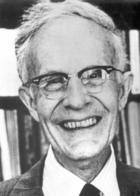
Theodore William Schultz (Arlington, South Dakota, 1902 - Evanston, Illinois, 1998) was an American economist who received the 1979 Nobel Prize in Economics, along with William Arthur Lewis, for his studies on human capital and his theoretical contribution to economic development, especially in Third World countries.
His works were framed within the theory of development, with the explanation of the factors that make possible the economic growth of a country; Starting from the poverty situation that affects developing countries, he concluded that only the progress of agriculture would lead to a subsequent process of industrialization under solid foundations and, therefore, to a balanced and rational development, contrary to the type of process lived by these countries in the second half of the 20th century, of which he has been one of their greatest critics. In this sense, he highlighted the decisive role played by "human capital" in the agricultural sector, in the same way that financial capital is vital in classical industrial development.




